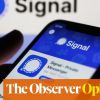-
 +29 +1
+29 +1Voynich Manuscript Finally Decoded? Medieval Sex Secrets May Hide in Mysterious Text
Sex may be one of the subjects detailed in the manuscript – and that the largest diagram represents both sex and conception.
-
 +32 +1
+32 +1The Linux Foundation and its partners are working on cryptography for the post-quantum world
Quantum computing is very much a mixed blessing.
-
 +27 +1
+27 +1Proposed European Electronic ID Law Raises Concerns
The harmonisation of standards for electronic identification across the EU should normally be soporific enough to send even the most Club-Mate-hyped hacker straight to sleep, but as Computer Weekly…
-
 +54 +1
+54 +1Encryption services are sending the right message to the quantum codebreakers
Quantum computers may still be years away, but it’s prudent that end-to-end encryption providers are ramping up defences
-
 +23 +1
+23 +1Captcha
-
 +30 +1
+30 +1Post-Quantum Resilience for Security Keys
We introduce a hybrid digital signature scheme based on two building blocks: a classically-secure scheme, ECDSA, and a post-quantum secure one, Dilithium. Our hybrid scheme maintains the guarantees of each underlying building block even if the other one is broken, thus being resistant to classical and quantum attacks.
-
 +29 +1
+29 +1So much for CAPTCHA – bots can do them quicker than humans
We, for one, welcome our distorted-letter-recognizing overlords
-
 +23 +1
+23 +1ATSC 3 DRM Encryption is Worse Than We Thought! #savefreetv !
-
 +23 +1
+23 +1Researchers find deliberate backdoor in police radio encryption algorithm
Vendors knew all about it, but most customers were clueless.
-
 +23 +1
+23 +1Cryptris - An asymmetric cryptography game
Discover the universe of cryptography: play against the computer to find out who will be able to decrypt the fastest. Many challenges await you, are you ready?
-
 +21 +1
+21 +1US federal agencies required to adopt post-quantum security, private sector advised to follow
In an era of quantum computing "arms race", it is time to transition to quantum-safe systems.
-
 +20 +1
+20 +1EU youth refuse to be surveilled - European Digital Rights (EDRi)
Poll: the 80% would not feel comfortable being politically active or exploring their sexuality if authorities can monitor their communication.
-
 +18 +1
+18 +114yo Tasmanian boy cracks national intelligence agency code in 'just over an hour'
A 14-year-old Tasmanian boy cracks four levels of code imprinted on a commemorative 50-cent coin in "just over an hour" after it was released by the nation's foreign intelligence cybersecurity agency — and the spy boss says she wants to meet him so she can "recruit him".
-
 +4 +1
+4 +1Scientists hid encryption key for Wizard of Oz text in plastic molecules
Scientists from the University of Texas at Austin sent a letter to colleagues in Massachusetts with a secret message: an encryption key to unlock a text file of L. Frank Baum's classic novel The Wonderful Wizard of Oz. The twist: The encryption key was hidden in a special ink laced with polymers, They described their work in a recent paper published in the journal ACS Central Science.
-
 +26 +1
+26 +1WhatsApp: We won't lower security for any government
The boss of WhatsApp says it will not "lower the security" of its messenger service. If asked by the government to weaken encryption, it would be "very foolish" to accept, Will Cathcart told the BBC. Government plans to detect child sex-abuse images include the possible scanning of private messages.
-
 +3 +1
+3 +1The Mastermind Episode 3: He Always Had a Dark Side
How did a Usenet troll and encryption genius become a criminal mastermind? For a man who built an empire in pixels, Paul Le Roux seemed like a digital phantom. After his name surfaced in the press in late 2014, I spent the better part of a year trying to understand him through the same means by which he’d directed his massive pharmacy business: the Internet. Late at night, I would open my laptop and plunge into an online wormhole, searching for clues about who Le Roux had been and what he became.
-
 +22 +1
+22 +1T-Mobile begins blocking iPhone users from enabling iCloud Private Relay in the US
Earlier today, a report indicated that some European carriers were blocking the Private Relay feature introduced by Apple with iOS 15. This feature is designed to give users an additional layer of privacy by ensuring that no one can view the websites that they visit.
-
 +17 +1
+17 +1FBI document shows what data can be obtained from encrypted messaging apps
A recently discovered FBI training document shows that US law enforcement can gain limited access to the content of encrypted messages from secure messaging services like iMessage, Line, and WhatsApp, but not to messages sent via Signal, Telegram, Threema, Viber, WeChat, or Wickr.
-
 +26 +1
+26 +1Session Is An Encrypted Messenger Geared Towards Privacy Enthusiasts
After the Facebook outage took WhatsApp down earlier this week, there's been a renewed interest in decentralised and secure alternatives. Telegram was one of the biggest gainers during Facebook's outage, but there are options that are completely decentralised and private, built using Blockchain-like technology that powers Bitcoin and other cryptocurrencies.
-
 +21 +1
+21 +1Apple Seemingly Adds Russia to List of Countries Where iCloud Private Relay Won't Be Available
Alongside iOS 15, Apple introduced an iCloud+ service that adds new features to its paid iCloud plans. One of these features is iCloud Private Relay, which is designed to encrypt all of the traffic leaving your device so no one can intercept it or read it.
Submit a link
Start a discussion




















